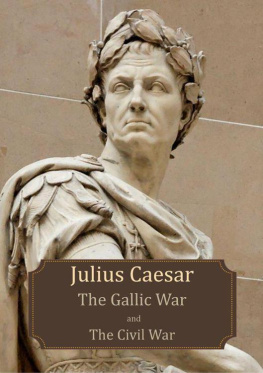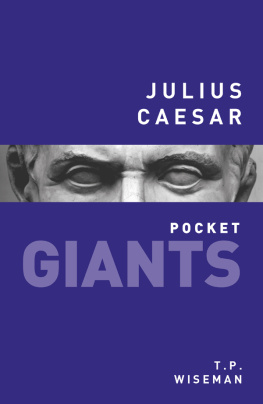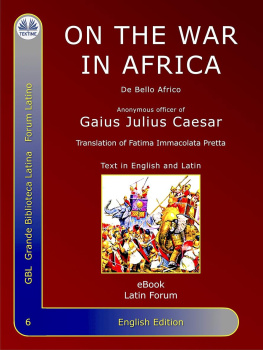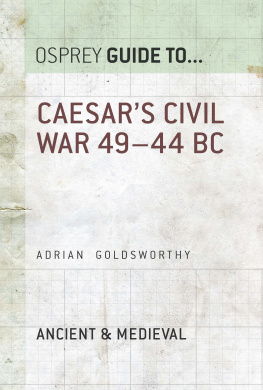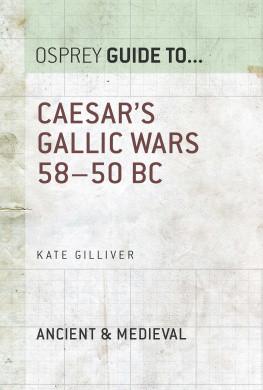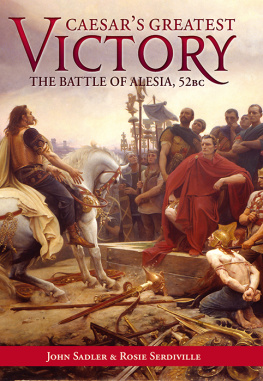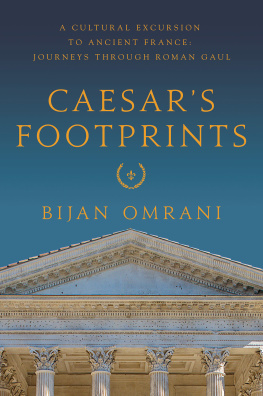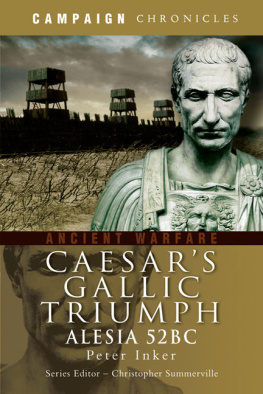Julius Caesar - The Gallic & Civil Wars
Here you can read online Julius Caesar - The Gallic & Civil Wars full text of the book (entire story) in english for free. Download pdf and epub, get meaning, cover and reviews about this ebook. year: 2012, publisher: CreateSpace Independent Publishing Platform, genre: Science. Description of the work, (preface) as well as reviews are available. Best literature library LitArk.com created for fans of good reading and offers a wide selection of genres:
Romance novel
Science fiction
Adventure
Detective
Science
History
Home and family
Prose
Art
Politics
Computer
Non-fiction
Religion
Business
Children
Humor
Choose a favorite category and find really read worthwhile books. Enjoy immersion in the world of imagination, feel the emotions of the characters or learn something new for yourself, make an fascinating discovery.
- Book:The Gallic & Civil Wars
- Author:
- Publisher:CreateSpace Independent Publishing Platform
- Genre:
- Year:2012
- Rating:3 / 5
- Favourites:Add to favourites
- Your mark:
- 60
- 1
- 2
- 3
- 4
- 5
The Gallic & Civil Wars: summary, description and annotation
We offer to read an annotation, description, summary or preface (depends on what the author of the book "The Gallic & Civil Wars" wrote himself). If you haven't found the necessary information about the book — write in the comments, we will try to find it.
The Gallic & Civil Wars — read online for free the complete book (whole text) full work
Below is the text of the book, divided by pages. System saving the place of the last page read, allows you to conveniently read the book "The Gallic & Civil Wars" online for free, without having to search again every time where you left off. Put a bookmark, and you can go to the page where you finished reading at any time.
Font size:
Interval:
Bookmark:
The Gallic War and The Civil War
(De Bello Gallico and Other Commentaries)
Caius Julius Caesar
BY THOMAS DE QUINCEY
The character of the First Caesar has perhaps never been worse appreciated than by him who in one sense described it best; that is, with most force and eloquence wherever he really did comprehend it. This was Lucan, who has nowhere exhibited more brilliant rhetoric, nor wandered more from the truth, than in the contrasted portraits of Caesar and Pompey. The famous line, "Nil actum reputans si quid superesset agendum," is a fine feature of the real character, finely expressed. But, if it had been Lucan's purpose (as possibly, with a view to Pompey's benefit, in some respects it was) utterly and extravagantly to falsify the character of the great Dictator, by no single trait could he more effectually have fulfilled that purpose, nor in fewer words, than by this expressive passage, "Gaudensque viam fecisse ruina." Such a trait would be almost extravagant applied even to Marius, who (though in many respects a perfect model of Roman grandeur, massy, columnar, imperturbable, and more perhaps than any one man recorded in History capable of justifying the bold illustration of that character in Horace, "Si fractus illabatur orbis, impavidum ferient ruinae") had, however, a ferocity in his character, and a touch of the devil in him, very rarely united with the same tranquil intrepidity. But, for Caesar, the all-accomplished statesman, the splendid orator, the man of elegant habits and polished taste, the patron of the fine arts in a degree transcending all example of his own or the previous age, and as a man of general literature so much beyond his contemporaries, except Cicero, that he looked down even upon the brilliant Sylla as an illiterate personto class such a man with the race of furious destroyers exulting in the desolations they spread is to err not by an individual trait, but by the whole genus. The Attilas and the Tamerlanes, who rejoice in avowing themselves the scourges of God, and the special instruments of his wrath, have no one feature of affinity to the polished and humane Caesar, and would as little have comprehended his character as he could have respected theirs. Even Cato, the unworthy hero of Lucan, might have suggested to him a little more truth in this instance, by a celebrated remark which he made on the characteristic distinction of Caesar, in comparison with other revolutionary disturbers; for, said he, whereas others had attempted the overthrow of the state in a continued paroxysm of fury, and in a state of mind resembling the lunacy of intoxication, Caesar, on the contrary, among that whole class of civil disturbers, was the only one who had come to the task in a temper of sobriety and moderation (unum accessisse sobrium ad rempublicam delendam).
Great as Caesar was by the benefit of his original nature, there can be no doubt that he, like others, owed something to circumstances; and perhaps amongst those which were most favourable to the premature development of great self-dependence we must reckon the early death of his father. It is, or it is not, according to the nature of men, an advantage to be orphaned at as early age. Perhaps utter orphanage is rarely or never such: but to lose a father betimes may, under appropriate circumstances, profit a strong mind greatly. To Caesar it was a prodigious benefit that he lost his father when not much more than fifteen. Perhaps it was an advantage also to his father that he died thus early. Had he stayed a year longer, he might have seen himself despised, baffled, and made ridiculous. For where, let us ask, in any age, was the father capable of adequately sustaining that relation to the unique Caius Juliusto him, in the appropriate language of Shakespeare
"The foremost man of all this world?"
And, in this fine and Caesarean line, "this world" is to be understood not of the order of co-existences merely,` but also of the order of successions; he was the foremost man not only of his contemporaries, but also, within his own intellectual class, of men generallyof all that ever should come after him, or should sit on thrones under the denominations of Czars, Kesars, or Caesars of the Bosphorus and the Danube; of all in every age that should inherit his supremacy of mind, or should subject to themselves the generations of ordinary men by qualities analogous to his. Of this infinite superiority some part must be ascribed to his early emancipation from paternal control. There are very many cases in which, simply from considerations of sex, a female cannot stand forward as the head of a family, or as its suitable representative. If they are even ladies paramount, and in situations of command, they are also women. The staff of authority does not annihilate their sex; and scruples of female delicacy interfere for ever to unnerve and emasculate in their hands the sceptre however otherwise potent. Hence we see, in noble families, the merest boys put forward to represent the family dignity, as fitter supporters of that burden than their mature mothers. And of Caesar's mother, though little is recorded, and that little incidentally, this much at least we learnthat, if she looked down upon him with maternal pride and delight, she looked up to him with female ambition as the re-edifier of her husband's honours, looked with reverence as to a column of the Roman grandeur and with fear and feminine anxieties as to one whose aspiring spirit carried him but too prematurely into the fields of adventurous strife. One slight and evanescent sketch of the relations which subsisted between Caesar and his mother, caught from the wrecks of time, is preserved both by Plutarch and Suetonius. We see in the early dawn the young patrician standing upon the steps of his patrimonial portico, his mother with her arms wreathed about his neck, looking up to his noble countenance, sometimes drawing auguries of hope from features so fitted for command, sometimes boding an early blight to promises so dangerously magnificent. That she had something of her son's aspiring character, or that he presumed so much in a mother of his, we learn from the few words which survive of their conversation. He addressed to her no language that could tranquillise her fears. On the contrary, to any but a Roman mother his valedictory words, taken in connexion with the known determination of his character, were of a nature to consummate her depression, as they tended to confirm the very worst of her fears. He was then going to stand his chance in a popular electioneering contest for an office of the highest dignity, and to launch himself upon the storms of the Campus Martius. At that period, besides other and more ordinary dangers, the bands of gladiators, kept in the pay of the more ambitious or turbulent amongst the Roman nobles, gave a popular tone of ferocity and of personal risk to the course of such contests; and, either to forestall the victory of an antagonist, or to avenge their own defeat, it was not at all impossible that a body of incensed competitors might intercept his final triumph by assassination. For this danger, however, he had no leisure in his thoughts of consolation; the sole danger which he contemplated, or supposed his mother to contemplate, was the danger of defeat, and for that he reserved his consolations. He bade her fear nothing; for that his determination was to return with victory, and with the ensigns of the dignity he sought, or to return a corpse.
Early indeed did Caesar's trials commence; and it is probable, that, had not the death of his father, by throwing him prematurely upon his own resources, prematurely developed the masculine features of his character, forcing him whilst yet a boy under the discipline of civil conflict and the yoke of practical life, even his energies might have been insufficient to sustain them. His age is not exactly ascertained; but it is past a doubt that he had not reached his twentieth year when he had the hardihood to engage in a struggle with Sylla, then Dictator, and exercising the immoderate powers of that office with the licence and the severity which History has made so memorable. He had neither any distinct grounds of hope, nor any eminent example at that time, to countenance him in this strugglewhich yet he pushed on in the most uncompromising style, and to the utmost verge of defiance. The subject of the contest gives it a further interest. It was the youthful wife of the youthful Caesar who stood under the shadow of the great Dictator's displeasure; not personally, but politically, on account of her connexions: and her it was, Cornelia, the daughter of a man who had been four times consul, that Caesar was required to divorce: but he spurned the haughty mandate, and carried his determination to a triumphant issue, notwithstanding his life was at stake, and at one time saved only by shifting his place of concealment every night; and this young lady it was who afterwards became the mother of his only daughter. Both mother and daughter, it is remarkable, perished prematurely, and at critical periods of Caesar's life; for it is probable enough that these irreparable wounds to Caesar's domestic affections threw him with more exclusiveness of devotion upon the fascinations of glory and ambition than might have happened under a happier condition of his private life. That Caesar should have escaped destruction in this unequal contest with an enemy then wielding the whole thunders of the state, is somewhat surprising; and historians have sought their solution of the mystery in the powerful intercessions of the vestal virgins, and several others of high rank amongst the connexions of his great house. These may have done something; but it is due to Sylla, who had a sympathy with everything truly noble, to suppose him struck with powerful admiration for the audacity of the young patrician, standing out in such severe solitude among so many examples of timid concession; and that to this magnanimous feeling in the Dictator much of the indulgence which he showed may have been really due. In fact, according to some accounts, it was not Sylla, but the creatures of Sylla (adjutores), who pursued Caesar. We know, at all events, that Sylla formed a right estimate of Caesar's character, and that, from the complexion of his conduct in this one instance, he drew that famous prophecy of his future destiny; bidding his friends beware of that slipshod boy, "for that in him lay couchant many a Marius." A grander testimony to the awe which Caesar inspired, or from one who knew better the qualities of that Cyclopean man by whose scale he measured the patrician boy, cannot be imagined.
Next pageFont size:
Interval:
Bookmark:
Similar books «The Gallic & Civil Wars»
Look at similar books to The Gallic & Civil Wars. We have selected literature similar in name and meaning in the hope of providing readers with more options to find new, interesting, not yet read works.
Discussion, reviews of the book The Gallic & Civil Wars and just readers' own opinions. Leave your comments, write what you think about the work, its meaning or the main characters. Specify what exactly you liked and what you didn't like, and why you think so.

